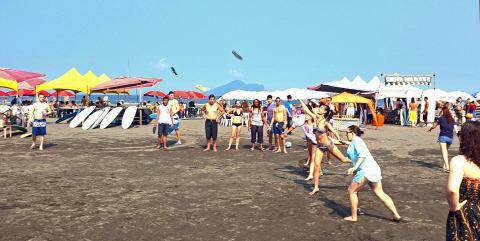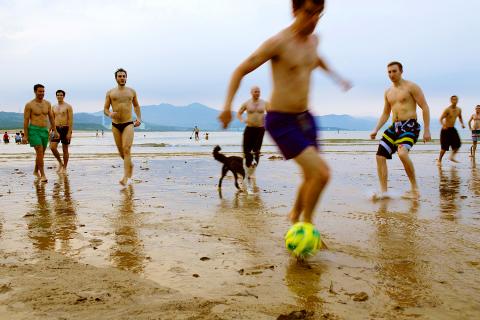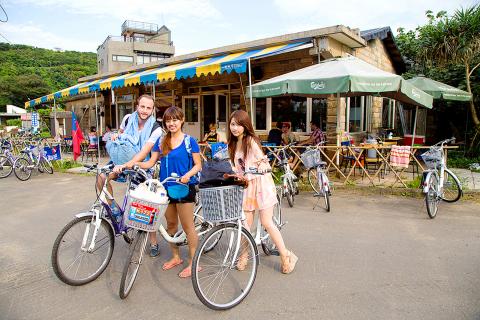When Chris Carnahan founded Taipei Trends in 2011, he envisioned the blog to be a space to tell the world everything about Taiwan — its food, its culture and its people. Since then, he has assembled a small team of dedicated writers and editors, and in addition to doing round-ups of eateries and entertainment spots, they’ve been organizing regular meet-ups where they take groups of people out to explore Taiwan through bike rides, snorkeling, cliff jumping, paragliding and bungee jumping.
If that’s not enough, they’ve also gone laser tagging, ate to their hearts’ content at potlucks, ventured inside 200-year-old homes in Tainan and played with monkeys in Kaohsiung. According to Carnahan, turn up at these events, like readership of their Web site, is largely half Taiwanese and half expat.
On Saturday, Taipei Trends will be hosting Fulong Full On, an all-day party at Fulong Beach, with activities such as water balloon tosses, relay races and sand sculpture competitions. The event will be the third large-scale beach party Taipei Trends has organized, the first being in Waiao and the one last year being a two-day camp in Fulong where they rented cabins at a campground. For this year’s Fulong Full On, they decided to scale back a bit, although there will still be the essentials: food, drinks, live music and DJs.

Photo courtesy of Taipei Trends
CULTIVATING COMMUNITY
Like many expats, Carnahan — who initially came here on an exchange program and decided to stay on — was drawn to the allure of Taiwan being under-explored and relatively unknown to the rest of the world. Great hiking trails and surf spots are everywhere, and yet not many people, even locals, know of their existence.
One thing that’s growing, Carnahan has noticed, is the number of niche groups who are organizing events for people to get together to explore the outdoors or enjoy artsy happenings in the city.

Photo courtesy of Taipei Trends
This is something he missed while working a brief stint in Shanghai, a city which he says, “has tons of connected people that know what’s happening around town, but where there is actually nothing really substantial going on, especially in art and recreation.”
Unlike some long-time residents, Carnahan doesn’t believe that Taiwan should remain a secret. Taipei is a great city on par with Hong Kong and Tokyo, he says, while Taiwan also has much to offer artists and adventurers.
“It should be cultivated by similarly adventurous people who want to preserve the culture and strong identity of Taiwan, before it’s quietly overrun by money-hungry real-estate companies and [Chinese] tourists,” Carnahan says.

Photo courtesy of Taipei Trends
TURNING OF THE TIDE?
But maybe the tide is turning. Outdoor activities, especially beach activities, are slowly becoming more acceptable.
“Fulong has a great community of people who encourage their kids to go out and play in the water and learn how to surf,” Carnahan says.
Over the years, he’s seen an increase in free divers, scuba divers and surfers, all of whom he hopes the Taipei Trends community will become more acquainted with.
The idea, Carnahan says, is to “work with them to spread the idea of beach culture, before all the beaches are taken over by commercial interests.”
He adds that some events in the past have done a bad job at promoting beach life — people go to these parties and litter, cause problems and never end up going in the water. Beach culture, Carnahan says, is not defined by spring break or music festivals, but it’s about hanging out at the beach, surfing and of course, playing in the water.
“If they wanted to go to a club, they could have just stayed in Taipei.”
This is why Carnahan didn’t want to emphasize too heavily on the “party” aspect when getting the word out about Fulong Full On. Rather, he says, it should also be mingling, taking a dip in the ocean and simply having a good time. Taipei Trends has also informed the local police and tourism bureau of the event and together with a team of volunteers, they will be combing the beach for garbage the next morning.
On that note, if you’re looking for some fun in the sun, head out to Fulong Beach on Saturday morning. If you’re looking to rave, then perhaps you’re better off taking refuge at one of the many night clubs playing similar EDM beats in Taipei.

That US assistance was a model for Taiwan’s spectacular development success was early recognized by policymakers and analysts. In a report to the US Congress for the fiscal year 1962, former President John F. Kennedy noted Taiwan’s “rapid economic growth,” was “producing a substantial net gain in living.” Kennedy had a stake in Taiwan’s achievements and the US’ official development assistance (ODA) in general: In September 1961, his entreaty to make the 1960s a “decade of development,” and an accompanying proposal for dedicated legislation to this end, had been formalized by congressional passage of the Foreign Assistance Act. Two

March 31 to April 6 On May 13, 1950, National Taiwan University Hospital otolaryngologist Su You-peng (蘇友鵬) was summoned to the director’s office. He thought someone had complained about him practicing the violin at night, but when he entered the room, he knew something was terribly wrong. He saw several burly men who appeared to be government secret agents, and three other resident doctors: internist Hsu Chiang (許強), dermatologist Hu Pao-chen (胡寶珍) and ophthalmologist Hu Hsin-lin (胡鑫麟). They were handcuffed, herded onto two jeeps and taken to the Secrecy Bureau (保密局) for questioning. Su was still in his doctor’s robes at

Last week the Democratic Progressive Party (DPP) said that the budget cuts voted for by the China-aligned parties in the legislature, are intended to force the DPP to hike electricity rates. The public would then blame it for the rate hike. It’s fairly clear that the first part of that is correct. Slashing the budget of state-run Taiwan Power Co (Taipower, 台電) is a move intended to cause discontent with the DPP when electricity rates go up. Taipower’s debt, NT$422.9 billion (US$12.78 billion), is one of the numerous permanent crises created by the nation’s construction-industrial state and the developmentalist mentality it

Experts say that the devastating earthquake in Myanmar on Friday was likely the strongest to hit the country in decades, with disaster modeling suggesting thousands could be dead. Automatic assessments from the US Geological Survey (USGS) said the shallow 7.7-magnitude quake northwest of the central Myanmar city of Sagaing triggered a red alert for shaking-related fatalities and economic losses. “High casualties and extensive damage are probable and the disaster is likely widespread,” it said, locating the epicentre near the central Myanmar city of Mandalay, home to more than a million people. Myanmar’s ruling junta said on Saturday morning that the number killed had